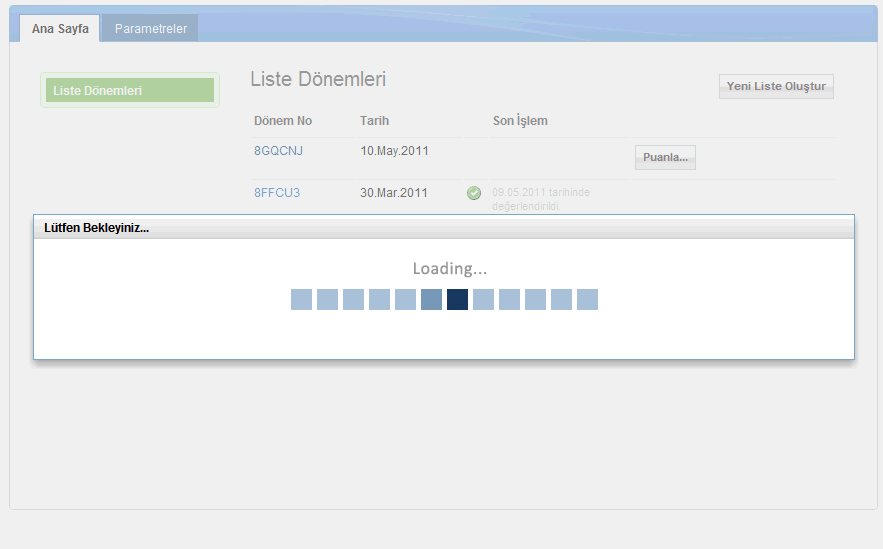XPages Tip: A modal waiting dialog for background processes.
When there is a background processing where the user should wait until it's done, I don't want him/her to click anywhere else in the screen. But I also want the user to know s/he'll have to wait.
Overdemanding?
I found a very simple solution to this problem. Sure there is more elegant solutions without dojo, but let me share it...
This is the main screen:
When user clicks the pointed button, there is a background process which would take 20-25 seconds. It is a long time for a web application. So we will somehow alert user that s/he has to wait a moment...
This is the initial code of the button:
<xp:button value="Puanla..." id="button1" styleClass="lotusBtn">
<xp:eventHandler event="onclick" submit="true" refreshMode="partial" refreshId="termsPanel">
<xp:this.action><![CDATA[#{javascript:scoreTerm(termEntry.getDocument())}]]></xp:this.action>
</xp:eventHandler>
</xp:button>
First we activate dojo and add needed modules in our XPage/custom control:
Now we will create our dialog div. You can create it anywhere in the page:
<div id="progressDialog" dojoType="dijit.Dialog" title="Please wait...">
<div>
<xp:image url="/inProgress.gif" id="image3"></xp:image>
</div>
</div>
We could use "xp:panel" tag here and set dojo attributes. It's a matter of preference. "inProgress.gif" is an animated image just to create an illusion of progress :)
Now we create a couple of client side javascript functions to show and hide this dialog. Here is a little trick. We don't want the dialog closable. Since I could not find a solution for 'non-closable' dialog, just googled and used this approach.
function scoringCompleted() {
dlg=dijit.byId("progressDialog");
dlg.hide();
}
function scoringStarted() {
dlg=dijit.byId("progressDialog");
dlg._onKey = function(){return false;};
dlg.show();
}
Here (in the bold part), we set a widget event to prevent "ESC" key. Escape keystroke stop loading of the page but does not close the dialog. If you are using a background agent for processing, escape will not stop the processing. Meanwhile, a little close icon is automatically placed on the title bar of the dialog. We should hide it as well. Put the following code to the CSS file.
Now, it comes to the crucial part. We want to show our dialog when background process started and hide it finally. We simply change the button code as follows:
<xp:button value="Puanla..." id="button1" styleClass="lotusBtn">
<xp:eventHandler event="onclick" submit="true" refreshMode="partial" refreshId="termsPanel"
onStart="scoringStarted()"
onComplete="scoringCompleted()">
<xp:this.action><![CDATA[#{javascript:scoreTerm(termEntry.getDocument())}]]></xp:this.action>
</xp:eventHandler>
</xp:button>
Result is something like that:
Remember, onStart and onComplete parameters will only work with partial refresh... You may also use onError for handling errors (like time out).
UPDATE!!!
Tim suggested far better solution to use dojox.widget.Standby . I updated start and complete functions and now there is no need to create divs or css on my page. It may be parameterized laterfor different purposes. Here are my functions:
function scoringStarted() {
if(this.fullStandby==null) {
this.fullStandby = new dojox.widget.Standby({
target: document.forms[0] // it was dojo.body() which creates a problem in some dojo versions.
});
document.body.appendChild(fullStandby.domNode);
fullStandby.startup();
}
fullStandby.show();
}
function scoringCompleted() {
if(this.fullStandby!=null) fullStandby.hide();
}
Target object can be customized for a region in screen...



